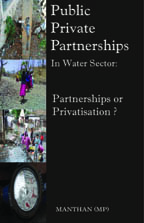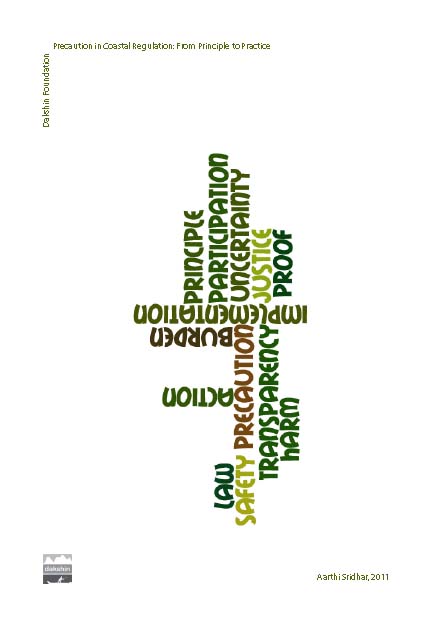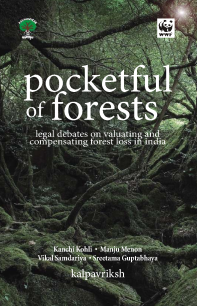/regions/india
India
Rainfed agriculture: Unlocking the potential – A book by CAB International
Posted on 24 Jun, 2011 08:39 PMThis is the seventh book by CAB International in the series on Comprehensive Assessment of Water Management.
Scaling up rural sanitation: Findings from the impact evaluation baseline survey in Madhya Pradesh
Posted on 24 Jun, 2011 03:43 PMThis report is a part of a series of papers that analysed the baseline data from all countries where the program was implemented.
Alternate management approaches for village water supply systems - Case studies from Maharashtra - A field note by WSP
Posted on 23 Jun, 2011 05:25 PMIt documents the approaches in a context where the state government agencies responsible for construction and management of rural water supply systems have been found to be facing limitations in O&M arrangements.
The traditional approach to provision of rural water supply in India has been supply driven, with emphasis on norms and targets and on construction and creation of assets, but with very little concern for sustainable arrangements for better management and maintenance of the facilities built. The viewpoint that users are ‘beneficiaries’ rather than empowered stakeholders among the service providers has led to alienation of the users.
UN-HABITAT invites entries for Urban arts and design youth competition – Apply by June 28, 2011
Posted on 23 Jun, 2011 11:43 AM The United Nations Human Settlements Programme, UN-HABITAT, is the United Nations agency for human settlements. It is mandated by the UN General Assembly to promote socially and environmentally sustainable towns and cities with the goal of providing adequate shelter for all.
The United Nations Human Settlements Programme, UN-HABITAT, is the United Nations agency for human settlements. It is mandated by the UN General Assembly to promote socially and environmentally sustainable towns and cities with the goal of providing adequate shelter for all.
"Upscaling innovative technologies" - Invites opinions and insights by 26 June 2011 as part of the 12th Five Year Plan sub group consultations, on increasing system of rice Intensification (SRI)
Posted on 22 Jun, 2011 04:39 PMThe purpose of the survey is to reflect on the experiences of professionals, researchers, policy managers and farmers on dissemination and sustainability of SRI practices and principles. This survey seeks to build on the experience of SRI professionals to look at the future role of SRI on household food security and poverty reduction, the institutional framework to expand SRI. In addition, the extent to which soil health, water stress, adoption/dis-adoption and capacity building issues have been accommodated within SRI policy will also be explored.
Forget Prometheus and remember Bhagiratha: Wrong and right thinking about rivers ' - Shri Ramaswamy Iyer s lecture at School of Environmental Sciences, Jawaharlal Nehru University (June 2011)
Posted on 22 Jun, 2011 09:55 AM“Current economic philosophy exalts consumption and growth. If we are hypnotised by visions of 8% or 10% growth, we are bound to ‘demand’ more and more and still more water; and either government engineers or private companies and their engineers will come up with supply-side answers in the form of large projects which will cause even greater distress to the rivers”.
Tehri Dam across Ganga
Source: haridwar.nic.in/ gangaji.htm
I am very grateful to Prof. Sudha Bhattacharya for having invited me to this Seminar. I was not sure whether what I have to say would fit in well with the theme of this Seminar, but she persuaded me to say yes, and so here I am.
Public Private Partnerships in the water sector: Partnerships or privatisation - A report and video by Manthan Adhyayan Kendra
Posted on 21 Jun, 2011 05:29 PM
This report and video by Manthan Adhyayan Kendra, looks at various aspects of PPPs, beginning from why PPPs have come to be regarded as the major approach for infrastructure development in the country, the circumstances that lead to the change in approach from direct privatisation to public-private partnerships, the current status of the PPP projects that are being executed in India, especially in the water sector, to the current estimates and projections of investment requirements for infrastructure development in India by governments and International Financial Institutions (IFIs).
Precaution in coastal regulation - From principle to practice – A report by Dakshin Foundation
Posted on 21 Jun, 2011 11:45 AM The decision to act or not act, and further how to act in the face of unknowns or uncertainties is the subject matter of the precautionary principle (PP). It is against this historical backdrop of unknowns in environmental governance that the present study on the precautionary principle was conducted.
The decision to act or not act, and further how to act in the face of unknowns or uncertainties is the subject matter of the precautionary principle (PP). It is against this historical backdrop of unknowns in environmental governance that the present study on the precautionary principle was conducted.
The present framework for environmental governance provides a number of areas where precaution can and must be applied. In addition to these areas, the present report is the outcome of a descriptive study that shows the extent to which key elements of the precautionary principle are embedded in the specific case of two environmental laws related to coasts. The study examines key areas of the clearance continuum (law-making, clearance and monitoring) through a single broad question: To what extent is the approach of precaution embedded in decision-making under the CRZ Notification 1991 and the Water Act, 1974?
Sridhar attempted to examine this question on a continuum that examines a) the text of the law, b) the conditions under which projects are cleared or rejected and c) issues related to the monitoring of these conditions. The Asia and Pacific Workshop Report of the Precautionary Principle Project declared that there are both explicit and implicit uses of the precautionary principle. It states that there are some instances where the PP’s application is explicit and unambiguous whereas in other decisions the PP is implicit. They also raise an important point that to actually determine whether a decision was indeed precautionary or not (where it is not explicit) requires an examination of the context and motivations for decisions and management interventions.
Down the drain – Exploring traditional water systems - A film by Tarun Jayaram
Posted on 21 Jun, 2011 10:41 AM
down the drain from tarun jayaram on Vimeo.
These are some of the questions which led Tarun Jayaram, the film-maker to explore traditional water systems in the country. From the documentary’s opening moments, the director engages us with a beautifully shot array of footages ranging from pilgrims taking a holy dip of Ganges to beautiful baolis and tankas of Rajasthan to the ancient town of Hampi in Karnataka, while establishing how rivers have been an integral part of Indian culture and how its rich tradition of harvesting rainwater needs to be re-established to deal with the present day water crisis. Over the refreshing images and soothing audio, it advocates the need for community participation in rejuvenating the traditional methods of rainwater harvesting.
